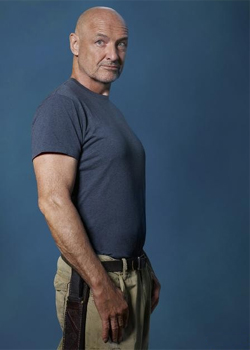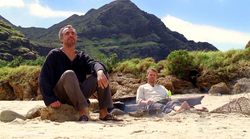Monday, May 24, 2010
"The End ..."
Friday, April 2, 2010
The Fall of the House of Kwon
- Sun's loss of English: While this could mean so many things, like what I mentioned above, it's most likely the joining of the two worlds. If "Sideways" Sun knew English, we would know it by now. She doesn't. The Sun of the island is slowly losing it. Eventually, we'll probably see her lose her ability to understand English as well. Slowly the worlds are becoming more and more similar.
- Sun's long glance in the mirror: Sun cuts her finger on the island and then notices it in the mirror in the sideways world. This is similar to Jack's cut on his neck, Jin's cut on his head, and Sawyer's cut on his hand - from a mirror. The worlds are converging slowly and subtly. From the very beginning, when Jack found his cut in the cramped bathroom on the plane, we were clued in on the fact that these are not separate worlds. Is it time? Is the island further in the future than we think?
- Mikhail's eye: Did anyone else cheer when Jin shot Mikhail in the eye? It was awesome! It was also another sign that the worlds are converging. Again, I can't escape the idea that the sideways world is really just the past and that eventually, these people will end up on the island and experience the events we are watching them experience, or the island world is moving backwards (Sun forgetting English). Mikhail's loss of an eye also calls on the literary figure of Polyphemus from The Odyssey. Not only was Polyphemus a cyclops and a loner who lived in a cave all by himself (similar to Mikhail living in a shack all by himself), but he was the son of Poseidon, god of the sea. It was after Odysseus poked his son's remaining eye out that Poseidon swore to destroy Odysseus before he returned back to his home in Ithaca to reunite with his wife. What god will stop Jin and Sun from getting back together? Is there more to learn about Mikhail? Does this have a connection to Desmond the traveller who is dedicated to his true love Penelope (the name of Odysseus' wife).
- Kate: Though not a main character in the last few episodes, her role seems important. Notice that she has become involved in many of the sideways story lines. She helped Claire, she stole Jack's pen, and she has been captured by Sawyer. Is she the constant that brings the two worlds together? Assuming she is not a candidate (which I am still not positive of), she is still very important. She has touched too many lives not to be. It is also not clear if she is actually on Flock's side. Her overall goal is blurry at best. Sawyer might be right that she wants to get off the island, but she wants to do it on her own terms and not before her work with Claire is done. But Claire has her own agenda. Let's not ignore the playing of "Amazing Grace" during the preview for next week's "Happily Ever After." Someone's number is up! Is it Kate?
Friday, February 19, 2010
More Questions ... Or Answers? A Look at "The Substitute"
Wednesday, February 3, 2010
"Look's Like We Made It ..."
Sunday, December 6, 2009
Holiday Favorites
Thursday, October 29, 2009
More Religion on LOST ...
I feel terrible! I have not been writing nearly enough about LOST. That does not mean I am not watching. Bonnie and I are almost done with the second season (remember the Hatch?). We are still discussing and debating the idea that John Locke has actually been the "Man in Black" from the beginning. Sometimes that theory works beautifully and other times not. While usually I would dismiss a theory for its inconsistency, one should not do that with LOST. Bonnie has suggested that in the third episode, when John Locke meets Smokey, is the "Man in Black" enters him, thus using Locke as a vessel throughout the show that he can enter and exit as he pleases. This would explain why sometimes Locke is very "Man in Black"-ish and other times he is not.
But this posting is not about that. I've often discussed the correlations between religion and LOST. By now, it's easy to assume that the writers are using religion as a basis for many plot points, yet we still don't know what they mean. 108? Jacob and Esau? What else? Recently we viewed the episode entitled "S.O.S." In this often-forgotten episode, the flashback is about Rose and Bernard (the first guest stars to get flashbacks). In this episode, we discover that Rose was diagnosed with cancer not too long after she meets, and is courted by, Bernard. After their marriage, Bernard takes her to Australia to see a "Faith Healer" named Isaac. Isaac fully admits that he is unable to heal Rose, though Rose decides to tell Bernard that he was successful, hoping Bernard's constant worrying will cease. Of course, on their way out of Australia, they crash on the island, where all diseases are "cured," such as Locke's need for a wheelchair.
The name “Isaac” appears approximately eighty times in the King James Bible. Isaac is the son of 100-year-old Abraham, who is destined to not to have children until God blesses him and his wife, Sarah, with a son. God then asks Abraham to sacrifice young Isaac to show his devotion. Eventually, God changes his request to a minor circumcision, the first on record. So why name a Faith Healer “Isaac”? The connection is not as strong as some of the others in the show, but, in the Bible, Isaac bares two sons: Jacob and Esau.
Let’s assume for a little while that the “Man in Black” is Esau. According to the story, Isaac goes blind due to old age but before he dies, is supposed to bless the eldest son with the blessing he received from his father, who received it from God. Esau, jealous of big brother Jacob, pretends to be Jacob by gluing hair on his arm (apparently Jacob was quite hairy). This naturally begins a battle between the two brothers, much like the battle between Cain and Abel (see my Cain & Abel / Locke & Ben theory on this blog).
If the writers are following the Bible as a guide, we may find out that Isaac the Faith Healer is the father of Jacob and the “Man in Black.” It would seem that, like in the Bible, Jacob is the favorite son and Esau hates him for it (“Jacob have I loved, but Esau have I hated” Malachi 1:2-4). It could be that while Jacob is the one responsible for sending the Oceanic Six to the island, it is his father, Isaac, sending the others. It stands to reason that if Isaac had healed Rose, she may have wanted to stay in Australia longer, therefore avoiding the fated Oceanic Flight 815.
Before we know it, we’ll be heading into Season Six! Another topic that needs to be discussed is the titles to the first few episodes of Season Six. We’ll get to that soon … For now, tune into ABCs new hit, FlashForward. It’s terrific for any LOST fan! I’m sure I’ll be commenting on it in The Correct Opinion soon.


